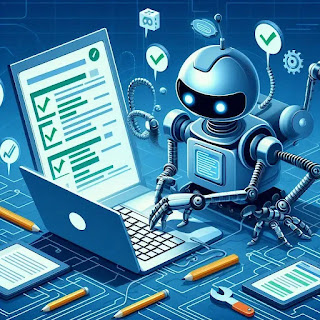ChatGPT vs GitHub Copilot: Which AI Assistant is Right for You?
Introduction: The Rise of AI-Assisted Development
With the advancement of AI technologies, tools like ChatGPT
vs GitHub Copilot have emerged as powerful resources for developers. But
how do they compare, and which one should you use for your workflow?
What is ChatGPT?
ChatGPT, developed by OpenAI, is a conversational AI
designed to assist with a wide range of tasks, from answering questions to
generating text-based content. It provides natural language responses and can
be used for brainstorming, debugging, and even explaining complex programming
concepts.
What is GitHub Copilot?
GitHub Copilot, powered by OpenAI Codex, is an AI-powered
code completion tool built specifically to assist developers by suggesting code
snippets and completing functions within IDEs. It integrates seamlessly with
platforms like Visual Studio Code and helps accelerate coding tasks.
Key Features of ChatGPT
ChatGPT offers a versatile set of features, such as:
- Natural
language understanding and generation
- Long-form
content creation
- Debugging
assistance
- Learning
and research support
- Generating
documentation and technical explanations
Key Features of GitHub Copilot
GitHub Copilot is tailored for developers, offering:
- Real-time
code suggestions
- Auto-completion
of functions and code blocks
- Seamless
integration with IDEs
- Adaptation
to different programming languages
- Support
for common coding patterns and best practices
Use Cases of ChatGPT
ChatGPT can be used for a variety of tasks beyond coding,
including:
- Generating
blog posts, documentation, and reports
- Explaining
programming concepts
- Brainstorming
solutions to technical problems
- Assisting
in debugging by analyzing code snippets
Use Cases of GitHub Copilot
GitHub Copilot excels in coding-related tasks such as:
- Generating
boilerplate code quickly
- Suggesting
solutions to programming challenges
- Completing
partially written functions
- Enhancing
productivity within development environments
Accuracy and Efficiency
When it comes to accuracy, ChatGPT excels at generating
human-like text but may struggle with complex or domain-specific programming
concepts. On the other hand, GitHub Copilot is more efficient in understanding
coding syntax and recommending solutions but may sometimes suggest insecure or
non-optimal code.
Integration with Development Environments
While ChatGPT operates primarily through web interfaces or
API calls, GitHub Copilot integrates directly into code editors, making it more
seamless for developers to use in real-time coding scenarios. For teams using
Keploy, an open-source tool for automated test case and mock generation,
ChatGPT can assist in explaining testing strategies, while Copilot can help
generate test code more efficiently.
Pricing and Access
Both ChatGPT and Copilot offer subscription models:
- ChatGPT:
Free version available, with a pro plan offering GPT-4 access
- GitHub
Copilot: Requires a subscription tied to GitHub’s plans
Pros and Cons of ChatGPT
Pros:
- Versatile
use cases
- Helps
in debugging and explaining code
- Can
generate non-code-related content
Cons:
- Lacks
direct integration with IDEs
- May
not provide the most optimized coding solutions
Pros and Cons of GitHub Copilot
Pros:
- Excellent
for auto-completing code
- Seamless
integration with development environments
- Boosts
coding productivity
Cons:
- May
generate insecure or incorrect code
- Subscription
required for full access
ChatGPT vs Copilot: Which One is Right for You?
The decision between ChatGPT and Copilot largely depends on
your needs:
- If
you're looking for an AI that can handle a range of tasks, including
explanations, debugging, and documentation, ChatGPT is ideal.
- If
you're focused on code generation and programming assistance, GitHub
Copilot might be the better option.
- For
teams leveraging automated testing tools like Keploy, combining ChatGPT
for test strategy insights and Copilot for generating test cases can
optimize the development process.
Conclusion: Embracing AI in Development
Both ChatGPT and GitHub Copilot represent the future of AI-powered tools, each excelling in their respective domains. By understanding their strengths and weaknesses, developers can harness their capabilities to streamline workflows, improve productivity, and enhance software quality with tools like Keploy.




Comments
Post a Comment